On Christmas Eve in 2019, Rachel Cairns had an abortion. Four years later, the writer and actress is performing her one-woman stage show, Hypothetical Baby, telling not only her own abortion story, but sharing an in-depth look into all of the interconnected personal and societal factors surrounding her choice.
“I actually had a lot of feelings about my abortion that I didn’t allow myself to have,” Rachel tells me in our chat, prior to the show’s current run at Tarragon Theatre. “I felt a lot of sadness and anger and regret that at 31, as somebody who wants kids, I couldn’t be like, Yeah, I’m able to do this.”
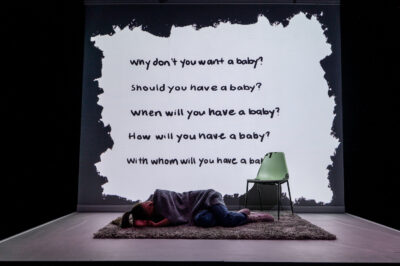
Hypothetical Baby is a much-needed reminder that abortion doesn’t exist in a vacuum. We simply can’t look at abortion as an isolated issue, and it runs far deeper than the pro-choice vs. pro-life narrative that tends to dominate the conversation. The play exemplifies how everything is connected, how huge systemic issues, like a lack of affordable housing and job stability, end up directly impacting one woman, and many like her, who make this choice.
“I hope it breaks down the silo that abortion is this standalone issue. Abortion is an issue about the infrastructure of care in our society. Abortion is an issue about our climate policy. It’s connecting abortion to all of these other issues that don’t seem necessarily related to abortion or feminist issues, but they are,” she says.
After her abortion, Rachel felt a natural craving to learn and read as much as she could. This led her to create her podcast Aborsh, a research-based, journalistic exploration of where we’re at with abortion and reproductive rights in Canada today, tackling a range of topics like the state of training for healthcare providers, the reasoning for a proactive right to abortion, Indigenous midwifery, and the link between access to reproductive health care services and economic growth, security, and well-being.
“The play is like Aborsh’s diary entry counterpart. It still touches on the same social issues, but it’s more so manifested in the personal,” Rachel says. “It’s a Christmas Eve abortion story. It’s fun. It’s funny. It’s playful. It’s talking about the private things in our lives like we do with our friends, with juicy oversharing and great irreverence.”
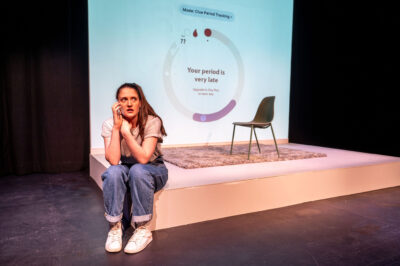
Hypothetical Baby takes us through key moments in Rachel’s life that surround her abortion, showing how her reproductive choices are so closely linked to her job, her identity and upbringing, how it affected her relationship, and what pregnancy and abortion actually felt like for her.
In the midst of these personal insights, Rachel isn’t afraid to hit you with the facts, including an impressive, increasingly frantic monologue of all of her pregnancy-related Google searches. You will probably walk away having learned something new about reproductive rights, the realities of childcare, or abortion— an experience that 1 in 3 people with uteruses will have in their lifetime.
The show also provides important historical context about abortion legalization and access in Canada, which Rachel connects to the stories of her mother’s abortions in the 1970s.
“We have this tremendous activism that these generations mobilized and fought and achieved for us that not a lot of us know about,” she says, noting the huge difference between her abortion experience and her mother’s, only one generation apart. “My mom had an illegal abortion and a legal abortion that was, in my opinion, draconian in terms of the steps she had to take to have it approved.”
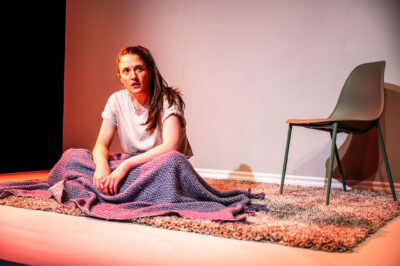
But even all these years later, Rachel acknowledges all the ways that the process could be more normalized—easier and more widespread access, doctors that don’t try to influence your choice with probing questions, not needing bulletproof glass at the abortion clinic.
This is why, as Rachel wrote in this piece for SheDoesTheCity in 2022, we need more abortion stories. “We end up internalizing the systemic and structural failures that inform and dictate things like reproductive choice. That’s what happened to me with my abortion. I felt like I had fucked up, like I hadn’t made good choices. When we start talking about it, maybe we can forge pathways to mobilization to actually do something about it.”
When Rachel wrote that piece for us, days before Roe v Wade was overturned, we knew she had something special and important with Aborsh, a much-needed project that looks at reproductive issues from a Canadian lens.
But her skill as an artist elevated her work with Hypothetical Baby, bringing a compelling personal story to life on stage with vulnerable storytelling, sharp and witty writing, and a nuanced exploration of wider social issues.
That’s pretty much everything we can hope for from a piece of art, which is why Rachel was the perfect choice for our final Artist of the Month of 2023, a series we launched this year to highlight women and non-binary creators of all artistic disciplines who are putting out bold and impactful work, breaking down barriers and making meaningful strides towards progress through their art.
Rachel grapples with the idea of progress in Hypothetical Baby, and what it actually means for different communities in Canada. “Canada is unique in that we’re one of the most progressive countries in the world when it comes to reproductive rights, but our history of reproductive oppression and its ongoing realities is most evident in Indigenous communities for whom choice is a compromised and often empty concept on so many levels,” she says, adding that she encourages the audience to reflect on this throughout her show.
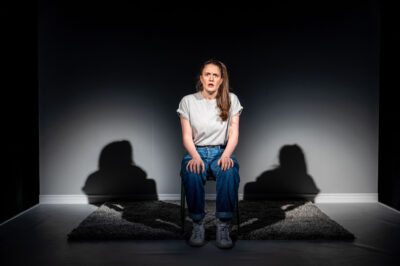
After four years of being immersed in stories and research about abortion, while her life has changed, Rachel tells me she’s still reckoning with many of the same big questions that she had after her abortion. “I still don’t have kids. I still really want to. It somehow gets even harder to have them, just in terms of how much it costs to be Canadian right now,” she says.
It’s clear that these issues touch so many people at all stages of their reproductive journeys. Following the release of the first season Aborsh, many listeners reached out to Rachel to share their own abortion stories, enough for her to create a second season of the podcast that continues to delve deeper into the social issues that intersect with how people make choices.
“The silver lining in all of this depressing, neoliberal late-stage capitalist hellscape is you’re not alone,” Rachel says. “Everyone’s trying to reckon with these impossible circumstances.”
Hypothetical Baby is on stage now until December 17 at Tarragon Theatre.


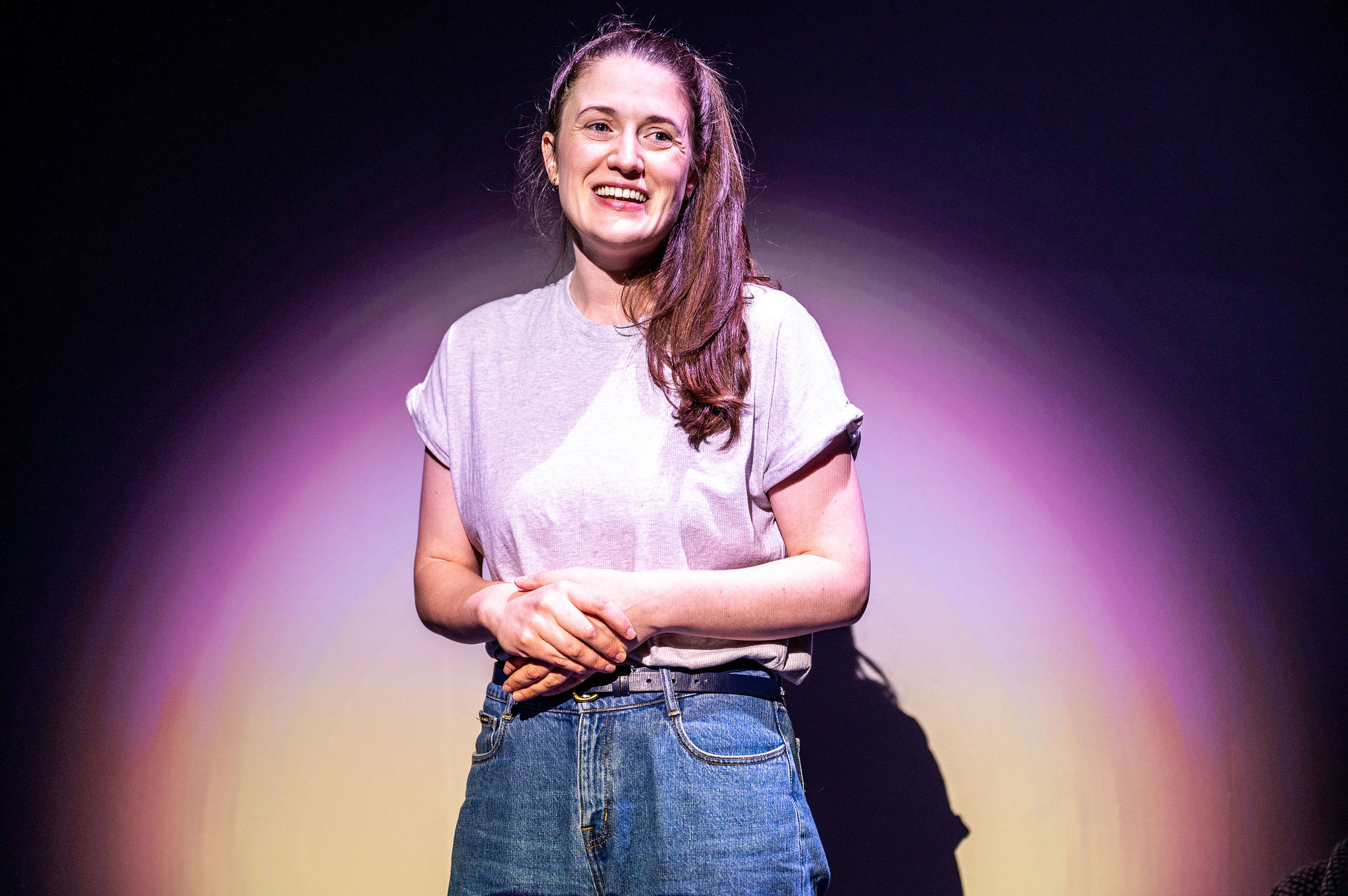
 Follow Us On Instagram
Follow Us On Instagram
